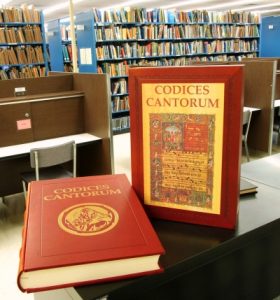 The Special Collections area at the Music and Performing Arts Library at the University of Illinois (MPALSC) is home to a unique collection of scores, rare books, recordings, pedagogical materials, and other archival materials used for scholarly inquiry and performance by students and faculty at the School of Music, the University of Illinois, and researchers throughout the world. Included in the collection are first edition scores of works by Francesco Geminiani and Robert Schumann, numerous facsimile editions of original manuscripts such as the Codex Squarcialupi, extensive runs of 19th century music periodicals such as Cäcilia eine Zeitschrift für die musikalische Welt, and primary reference resources such as the Histoire génerale de la musique of François-Joseph Fétis. The MPALSC holds the world’s largest and most comprehensive collection of Renaissance polyphonic music microfilms in the world, forming the core of the distinguished Musicological Archives for Renaissance Manuscript Studies.
The Special Collections area at the Music and Performing Arts Library at the University of Illinois (MPALSC) is home to a unique collection of scores, rare books, recordings, pedagogical materials, and other archival materials used for scholarly inquiry and performance by students and faculty at the School of Music, the University of Illinois, and researchers throughout the world. Included in the collection are first edition scores of works by Francesco Geminiani and Robert Schumann, numerous facsimile editions of original manuscripts such as the Codex Squarcialupi, extensive runs of 19th century music periodicals such as Cäcilia eine Zeitschrift für die musikalische Welt, and primary reference resources such as the Histoire génerale de la musique of François-Joseph Fétis. The MPALSC holds the world’s largest and most comprehensive collection of Renaissance polyphonic music microfilms in the world, forming the core of the distinguished Musicological Archives for Renaissance Manuscript Studies.
Notable special collections in the Music and Performing Arts Library include the Harry Partch archives, the Morris and Barnard Young collection of 19th and early 20th century popular music, the Paul Price Collection, the Walter J. Kasura collection of Russian folk music, the Paul Rolland string music collection, and the Lawrence King Collection of opera recordings and memorabilia. The MPALSC is home to a comprehensive collection of scores, manuscript facsimiles, and archival materials of the Finnish composer Yrjö Kilpinen, as well as to the highly popular film scores of Illinois native Frank Skinner.
The MPALSC works collaboratively with the Sousa Archives and the Center for American Music, University Archives, and the UI Rare Book and Manuscript Library to provide access to valuable resources while providing the best possible stewardship of its holdings. The primary aim of this distributed archives policy is to ensure preservation of valuable resources, encourage discovery of historical materials, and facilitate performance of unique musical works.